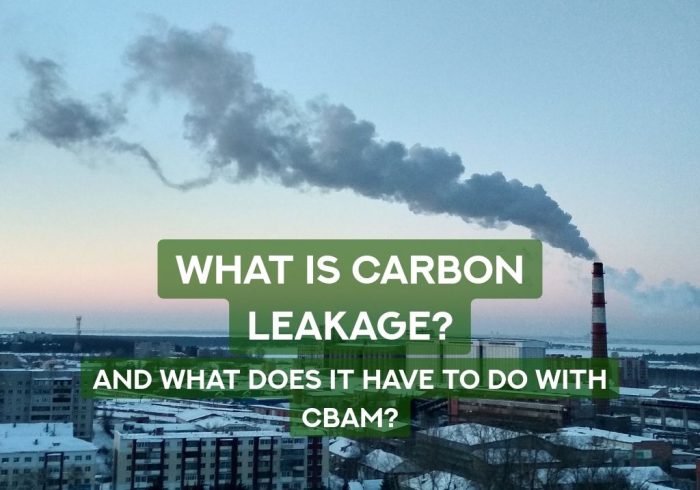What is Carbon Leakage?
And what does it have to do with CBAM?
Carbon leakage refers to when companies move their production from regions with strict climate policies to regions with fewer regulations. These imported goods are typically cheaper than those produced domestically due to the difference in carbon costs. Carbon leakage can also occur when domestically produced goods are replaced by more carbon intensive imports – shifting greenhouse gas emissions across borders through international trade.

For example, in the EU, carbon intensive goods – such as iron, steel, cement and fertilisers – are regulated by the EU Emissions Trading System (EU ETS) therefore producers of these items may struggle to compete with cheaper goods manufactured outside the EU – where there are fewer regulations. This lessens the efficiency of policies put in place to lower emissions and puts EU companies at a competitive disadvantage
Leakage can occur through several different channels:
- Competition Channel – Higher energy and carbon costs push industries to relocate to regions with looser regulations.
- Energy Market Channels – Strict emission rules in one region can lower the global demand for fossil fuels thus lowering the price. In response, other parts of the world might increase their consumption of fossil fuel.
- Free-Riding Channel – As one country reduces its emissions, other countries may feel less pressure to act and as a result – increase their emissions.
Why address Carbon Leakage?
Carbon leakage undermines the environmental efficiency of stringent climate policies such as in the EU. By just moving emissions abroad instead of directly reducing them, overall climate mitigation efforts are not as effective as intended.
With production in the EU being more costly for domestic industries, foreign competitors hold an economic competitive advantage – especially in energy-intensive and trade-exposed sectors such as cement, steel, aluminium and fertilisers. Addressing carbon leakage aims to protect EU industries from unfair competition and ensure a level playing field.
By addressing leakage, governments are strategically incentivising global climate action and avoiding “free riding.” As climate change mitigation is considered a global public good, countries may benefit from others emissions reduction – and raise their own emissions – without incurring costs themselves.
Public opinion is also important to consider here. If people see industry only shifting their emissions elsewhere instead of enacting genuine change, public support for climate policies will be weaker as these policies are viewed as ineffective.
How does EU CBAM aim to reduce Carbon Leakage?
The EU has rolled out the Carbon Border Adjustment Mechanism (CBAM) as its key measure to address carbon leakage. CBAM ensures that imported carbon-intensive goods face the same carbon costs as those produced within the EU, thereby leveling the playing field between domestic producers and foreign competitors.
Under CBAM, importers must purchase certificates – each corresponding to one tonne of CO₂ embedded in the imported product – priced in line with the EU Emissions Trading System (ETS). If a carbon price has already been paid in the country of origin, this amount can be deducted.
By applying a carbon price on imports, CBAM is set up to:
- Prevent production from shifting abroad to regions with weaker climate policies.
- Protect EU industries and jobs from unfair competition.
- Encourage cleaner production globally, as exporters to the EU have an incentive to reduce emissions.
- Supports the phase-out of free allowances under the EU ETS, strengthening decarbonisation incentives within the EU.
Together, these features make CBAM a cornerstone of the EU’s strategy to reduce carbon leakage while maintaining both environmental integrity and economic competitiveness.
Leveling the playing field...
Do you have a question about CBAM? We can answer it! At Carbon Complete, we know CBAM and are ready to help you navigate the emerging complexities of this topic through our risk assessment, advisory and training services. If CBAM is a bit too much for you, we can also manage your entire reporting requirements from start to finish. Fill out the form below if you’re seeking information on CBAM and we will get back to you!
